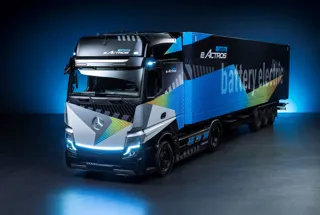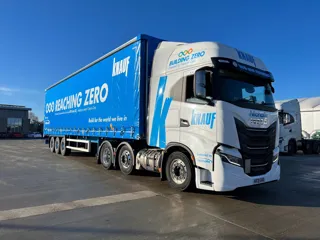Katrina McDonnell, head of energy transitions solutions at Certas
The transport sector has been the largest contributor to greenhouse gas emissions in the UK since 2016 and in 2020, transport was responsible for 24% of the UK’s total emissions.
With HGVs producing 19% of domestic transport emissions, the sector has an important role to play in contributing to the UK’s net zero goals.
Sustainability and environmental targets have climbed the business agenda, but current economic pressures have the potential to slow down the implementation of energy transition strategies.
So, what are the opportunities available to transport businesses looking to make positive changes for tomorrow, without affecting operational efficiency today?
Accelerating towards the decarbonisation
Despite the Government ramping up plans to achieve net zero targets, many businesses are still reticent to implement sustainable changes.
Potential disruption is often seen as one of the most significant barriers to adopting cleaner fuels but making the switch can be seamless and more sustainable with a positive impact on emissions and performance, immediate.
Cost is another important consideration. Although the price per litre cost of alternatives is often higher than standard diesel, the performance and efficiency benefits that alternative fuels can offer often provide longer-term cost savings that may not be front of mind when considering making the switch
Gas-to-liquid (GTL) fuel and hydrotreated vegetable oil (HVO) are just two examples of diesel alternatives which offer their own set of unique benefits for HGV fleets.
Improved efficiency with GTL fuel
GTL fuel is a cleaner, quieter, and longer lasting drop-in diesel alternative that can be used without modifications to either vehicles or engines.
These properties have made GTL fuel a popular choice for those wanting to switch to an alternative without disruption to their day-to-day operations.
In addition to its seamless integration advantages, GTL fuel also offers a number of performance and operational benefits.
GTL fuel is free from fatty acid methyl ester (FAME), a biofuel that has hygroscopic properties which can cause water contamination, diesel bugs, premature fuel ageing and instability (separation) in long-term storage.
As a result, when using GTL, fewer filter changes are required compared with diesel, which helps to reduce downtime and costs.
GTL has a naturally high cetane number, which in practical terms means that the combustion process is easier and more complete leading to a cleaner burn, a reduction in harmful emissions, excellent cold weather handling and much improved cold start performance.
In certain driving conditions and types of engine, GTL fuel can also reduce engine noise by 1-4 decibels which is particularly advantageous when operating in built-up areas.
Virtually free from sulphur, metals and aromatics, GTL fuel is non-toxic, less harmful to the environment and is also much safer to handle and store.
Ready to go with HVO
Made from sustainable feedstock such as recycled vegetable fats, HVO is a 100% biodegradable drop-in renewable diesel.
It instantly cuts greenhouse gas emissions by up to 90%, helping fleets reduce their carbon footprint with immediate effect.
The FAME and fossil-free fuel offers excellent low-temperature performance, higher filterability and improved combustion properties.
However, it’s important to remember that not all HVO is created equal.
From the type of feedstock to geopolitics, there are a number of factors that can determine the ethical and ecological impact of HVO.
In addition, it is important to note that the level of greenhouse gas emission savings can vary by product.
Savings are based on a life-cycle, well-to-wheel calculation, taking into account feedstock, production processes and transportation.
To be certain of the fuel’s environmental credentials, it’s important to choose an HVO supplier whose claims you can trust.
Look for a supplier who is an approved recognised fuel supplier under the Zemo partnership’s renewable fuels assurance scheme, can provide a full proof of sustainability certificate and is also part of the International Sustainable Carbon Certification system.
Transition to alternatives, your way
Fully committing to transitioning to HVO or GTL can seem like a big move for some businesses.
However, it’s important to be aware that there are solutions available to facilitate a more gradual transition.
As HVO and GTL are drop-in fuels and can be used interchangeably with DERV, split deliveries of the alternatives and conventional diesel can be arranged.
This helps to reduce the impact on fuel cost forecasting while making the necessary steps to operate more sustainably.
Accounting for the unavoidable with carbon offsetting
Carbon offsetting offers another viable option for businesses that may not be ready to fully transition to cleaner fuel alternatives but want to make tangible, sustainable change.
The process is simple – companies can account for unavoidable emissions by purchasing carbon credits from certified activities that help to reduce GHG emissions or absorb carbon dioxide, thus protecting natural ecosystems.
Carbon offsetting helps to fuel a greener business and differentiate from competitors, demonstrating a clear commitment to acting on climate change and reducing global carbon emissions.
Businesses also receive certificates to support ESG reporting, ensuring they’re playing their part in helping the environmental regeneration.
The future for HGV fleets
With deadlines looming, the journey towards a lower-emission future must be a combined effort across the transport sector.
Yet the transition needn’t be complicated or onerous.
A growing number of effective and robust solutions are available to help fleet operators take control of their future and achieve net-zero goals.





















Login to comment
Comments
No comments have been made yet.